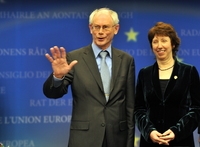 One of the main charges against the choice of Herman van Rompuy as the first permanent European Council President and Catherine Ashton as the EU’s foreign affairs supremo is the supposed “undemocratic” nature of the selection process. People who opposed the Lisbon Treaty have been particularly critical of the conclave-like decision-making. Daniel Hannan called it a “stitch-up that demeans democracy”.
One of the main charges against the choice of Herman van Rompuy as the first permanent European Council President and Catherine Ashton as the EU’s foreign affairs supremo is the supposed “undemocratic” nature of the selection process. People who opposed the Lisbon Treaty have been particularly critical of the conclave-like decision-making. Daniel Hannan called it a “stitch-up that demeans democracy”.
But it is hard to believe those critical voices, including on Coffee House, really want a democratic process as opposed to simply finding another thing to dislike about the EU (a fair position, but just not the same).
Let us think through for a moment what a democratic election would mean. It would mean an election campaign larger than the US presidential election (though smaller than India’s). It would mean a mandate for the President of the Council beyond that of any EU government. In fact, he or she would hold the largest democratic mandate in the world. The US president is elected by states and the Indian prime minister is the head of a parliamentary coalition. No other politicians would have gone to an electorate of 500 million voters and won a plurality.
Rather than do what the post was meant to – that is, help the 27 EU governments agree on issues – such a Council President would be powerful enough to set their own agenda, backed by a democratic mandate. Is that what you want? I did not think so. Herman van Rompuy is not “my” president any more than French EU official Pierre de Boissieu, is “my” Secretary-General of the Council, an administrative role he was appointed to by EU leaders. They are both appointed, not elected, to help the 27 EU leaders move their agenda forward and to be more effective versus the supranational element of the EU, the European Commission.
In the end, Mr Rompuy and Lady Ashton gain democratic legitimacy from being selected by governments who in turn are elected. Like the NATO or UN secretaries-general. That is what happens when international, even semi-supranational, organizations chose leaders, as opposed to the way countries do.
However, just because the Council President and the High Representative should not be directly elected, does not mean the process could not be more transparent. Candidates could, for example, be shortlisted before the EU leaders meet and asked to provide a statement of their strengths and experience, rather than a manifesto of their beliefs.






Comments